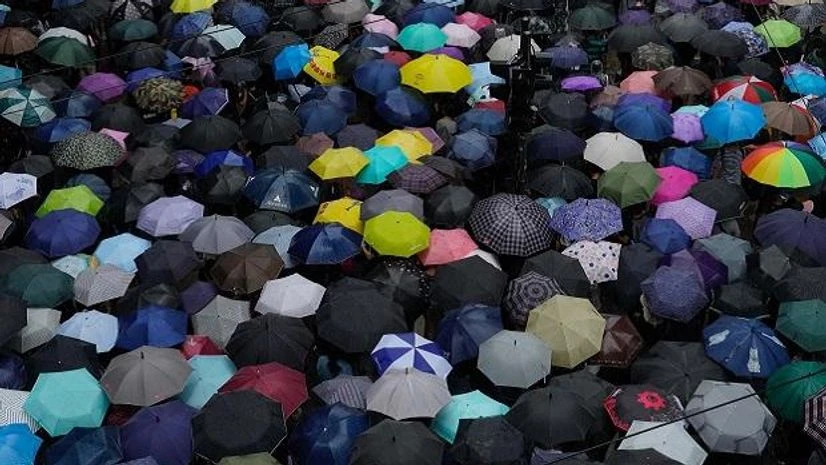Pro-democracy protesters on Wednesday stepped up a "blossom everywhere" campaign of road blocks and vandalism across Hong Kong that has crippled the international financial hub this week and ignited some of the worst violence in five months of unrest.
The new phase in the crisis, which has forced schools and shopping malls to close as well as the shutdown of large chunks of the vital train network, has prompted police to warn the city is on the verge of "total collapse" and a "breakdown".
China, facing the biggest challenge to its rule of the territory since it was handed back by the British in 1997, has insisted it will not buckle to the pressure and warned of even tougher security measures.
As they have since the start of the week, protesters on Wednesday choked roads and blocked traffic with anything they could lay their hands on including bricks, bicycles, couches and other materials. Key arterials routes were targeted in morning and after-work peak hours.
Various lines on the subway -- used daily by more than half of the city's 7.5 million people -- were also suspended, forcing many workers to stay at home.
In the Central business district, hundreds of people left their offices at lunchtime to join the more hardcore protesters setting up barricades outside luxury-item shops and headquarters of big financial firms.
Masked protesters dressed in their signature black were also locked in a series of tense standoffs at university campuses, following intense clashes on Tuesday night that saw police fire tear gas and rubber bullets.
More From This Section
Highlighting the growing security fears, mainland Chinese students began fleeing Hong Kong on buses and boats back across the border, according to police and universities, although it was not immediately clear how many had left.
The chaos was part of the largely leaderless protest movement's new strategy branded "blossom everywhere", in which small groups target as many parts of the city as possible to cause maximum disruption and stretch police resources.
Until this week protesters had largely confined their actions to evenings and the weekends.
The campaign began on Monday with an effort to shut down trains and enforce a city-wide strike, and has for the first time seen three straight days of chaos during the working week.
"The rioters' intention is to bring Hong Kong into a total breakdown. No excuse, no political motives can justify or glory this madness," police spokesman John Tse told reporters on Wednesday.
A day earlier, one of his colleagues said Hong Kong was "on the brink of total collapse".
The poisonous atmosphere worsened on Monday morning when a police officer shot an unarmed 21-year-old protester, leaving him in a critical condition.
It was only the third confirmed instance police had hit someone with live rounds since the unrest began in June.
The shooting, broadcast live on Facebook, exacerbated fury among protesters about what they say is excessive police violence.
However fears have also risen about increasingly violent tactics from the protesters.
On Monday a 57-year-old man, who had been arguing with protesters, with a flammable liquid and set him on fire. He was also hospitalised in critical condition.
The protest movement has been fuelled by anger that China is choking the liberties and freedoms that Hong Kong is meant to have under the terms of the handover deal with the British.
Protesters are demanding the right to freely elect their leaders.
Instead of offering concessions, China has responded with ominous warnings that it is prepared to further curb freedoms, and that it wants tougher security measures in Hong Kong.
On Tuesday the People's Daily, the mouthpiece of China's ruling Communist Party, signalled that local district elections due to be held on November 24 may be cancelled if the protesters do not back down.
"Only by supporting the police force to decisively put down the riots can (Hong Kong) return to peace and hold fair elections, to help Hong Kong start again," the commentary said.
Other powerful arms of the Chinese state media have also again raised the prospect this week of the Chinese military being deployed in Hong Kong to end the crisis.
Still, China is not yet prepared to take such drastic action as military intervention as it plays a longer game of weakening and intimidating the protest movement, according to Ben Bland, Sydney-based director of the Southeast Asia Project at the Lowy Institute, a policy think-tank.
"It still seems, as far as we can tell, that the most likely response is going to continue to be led by the Hong Kong authorities and the Hong Kong police," Bland told AFP on Wednesday.

)
